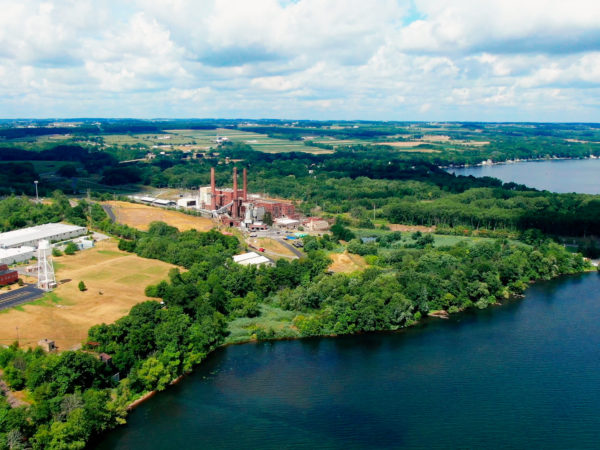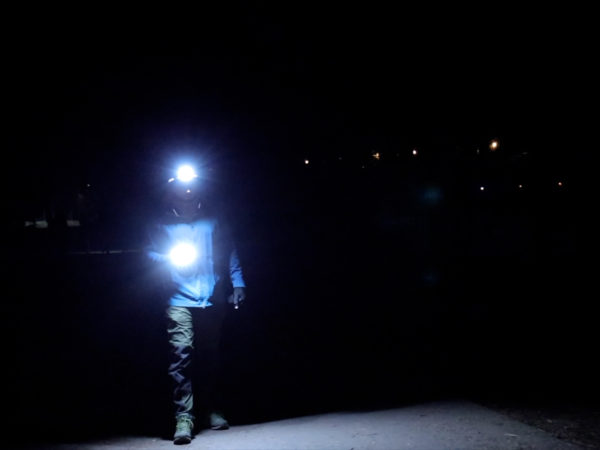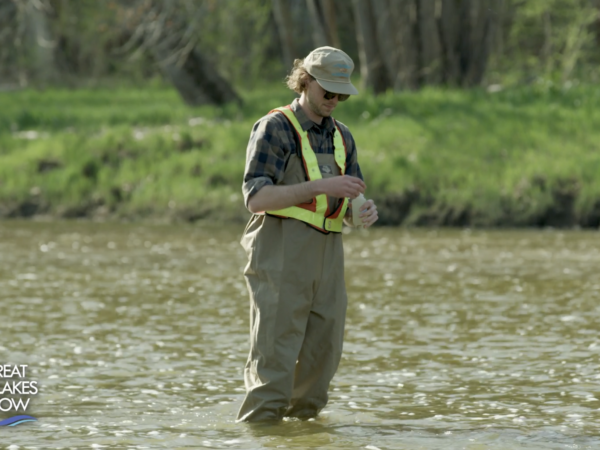
New Program Director Sandra Svoboda
Detroit Public Television’s Great Lakes Bureau is growing by leaps and bounds. This week, we are introducing you to Great Lakes Now Program Director Sandra Svoboda. Her full bio is HERE.
Next week, we will introduce you to some other new reporters – we now have a reporter on each Great Lake! – and soon we’ll re-introduce you to our Senior Correspondent Gary Wilson in Chicago.
But first, meet Svoboda:
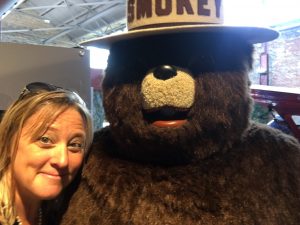
Sandra’s selfie with Smokey Bear at the Outdoor Adventure Center in Detroit.
Other kids went to Disney World on vacation. Growing up in suburban Chicago, Sandra Svoboda’s family hiked, paddled, fished, sailed, drove, and otherwise traversed the Great Lakes basin every summer.
Svoboda is the new Great Lakes Now program director at Detroit Public Television. But it’s not just her outdoor resume that qualified her for the job. She’s been a journalist for several decades, spending her career in Indiana, Illinois, Ohio and Michigan. Most recently she was at WDET-FM, Detroit public radio, where she worked in partnership with DPTV in the Detroit Journalism Cooperative. As part of that initiative, Svoboda first covered Detroit’s historic bankruptcy both on-air and online.
She’s also worked in print journalism at The (Toledo) Blade and Detroit’s Metro Times weekly alternative newspaper where she wrote about environmental justice, invasive species and other Great Lakes-related issues. (Her reporting once included eating Asian carp – it’s bony but tasty, she says.) She’s taught journalism, communications, and political science at Wayne State University and University of Michigan-Dearborn, and she’s picked up a couple of graduate degrees.
Great Lakes Now recently spoke with Svoboda about her background in media, love for the Lakes, and plans for Great Lakes Now at DPTV. Here are exceprts from that conversation:
![]() GLN: What do you think is the most misunderstood thing about the Great Lakes?
GLN: What do you think is the most misunderstood thing about the Great Lakes?
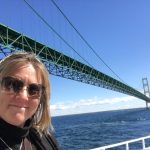 Svoboda: In the region, often the true uniqueness of the system. I just participated in workshops in the Upper Peninsula and on the St. Lawrence River with the Institute for Journalism & Natural Resources with writers and photographers from around the country. Some had never seen the Great Lakes before, and they were truly taken aback by the majesty, the beauty, the complexity of the science, commerce, tourism and population of people in the Basin. Sure, a lot of us who live here do pause to vacation in the cities and more remote areas along the extensive shoreline, but we don’t always fully stop to appreciate just how unique this all is and how lucky we are to be so close.
Svoboda: In the region, often the true uniqueness of the system. I just participated in workshops in the Upper Peninsula and on the St. Lawrence River with the Institute for Journalism & Natural Resources with writers and photographers from around the country. Some had never seen the Great Lakes before, and they were truly taken aback by the majesty, the beauty, the complexity of the science, commerce, tourism and population of people in the Basin. Sure, a lot of us who live here do pause to vacation in the cities and more remote areas along the extensive shoreline, but we don’t always fully stop to appreciate just how unique this all is and how lucky we are to be so close.
![]() Explain what your role is at Great Lakes Now. How will your background in journalism – print, digital and radio – help you do the work?
Explain what your role is at Great Lakes Now. How will your background in journalism – print, digital and radio – help you do the work?
 As program director, I’ll be doing a lot of administrative work. Exciting to talk about and hear about, I know! But Great Lakes Now is lucky to have some awesome grants from funders, and those require a fair amount of documentation, developing and collecting metrics, increasing the distribution of the work that you and the writers/producers/videographers do, finding matching and additional funds to grow the initiative.
As program director, I’ll be doing a lot of administrative work. Exciting to talk about and hear about, I know! But Great Lakes Now is lucky to have some awesome grants from funders, and those require a fair amount of documentation, developing and collecting metrics, increasing the distribution of the work that you and the writers/producers/videographers do, finding matching and additional funds to grow the initiative.
Yes, I’ve been a journalist for most of my career, which means I’m always looking for ways to explain news and the complexity of stories and not afraid of constant deadlines. But in this new role, I’ll be focusing completely on Great Lakes subject matter – both serious and hopefully some of the fun going on – and helping reporters like you do an even better job reporting about the Great Lakes region and connecting with audiences and partners around it too. We’ll have events, get your documentaries out to more audiences, create some educational material, and who knows where this will all go? Maybe build some new shows, do some cool multi-media collaborative projects with other media or schools…we’ve got no shortage of ideas or potential around here!
![]() What do you see as the biggest challenge?
What do you see as the biggest challenge?
 Honestly, not being overwhelmed by what’s at stake. What’s at stake for the Lakes and the people who live, work, play, and visit. What’s at stake for communities who are facing some pretty big environmental, financial, infrastructure, climatological issues that impact the Lakes. What’s at stake for international relations between the United States and Canada with trade, ecological, political and other issues that relate to the Lakes. But as far as the daily job around here, the biggest challenges relate to today’s media environment.
Honestly, not being overwhelmed by what’s at stake. What’s at stake for the Lakes and the people who live, work, play, and visit. What’s at stake for communities who are facing some pretty big environmental, financial, infrastructure, climatological issues that impact the Lakes. What’s at stake for international relations between the United States and Canada with trade, ecological, political and other issues that relate to the Lakes. But as far as the daily job around here, the biggest challenges relate to today’s media environment.
![]() Can you expand on that?
Can you expand on that?
 This industry has changed immensely just in my time in it. I came to Detroit in the early 90s after journalism school at Indiana University to work for The Associated Press after a stint as an intern at the Muskegon Chronicle and as a police reporter at The Daily Herald, a suburban paper in Chicago. Sure, the basics of doing original reporting by sniffing out stories, getting the facts, finding and building a network of sources, doing research, building on your previous work, writing well, thinking quickly, considering what audiences want/need/should know, finding images and video and graphics – that’s all the same and always should be for any media company.
This industry has changed immensely just in my time in it. I came to Detroit in the early 90s after journalism school at Indiana University to work for The Associated Press after a stint as an intern at the Muskegon Chronicle and as a police reporter at The Daily Herald, a suburban paper in Chicago. Sure, the basics of doing original reporting by sniffing out stories, getting the facts, finding and building a network of sources, doing research, building on your previous work, writing well, thinking quickly, considering what audiences want/need/should know, finding images and video and graphics – that’s all the same and always should be for any media company.
But the Internet and now Smartphones and how video and TV are evolving, the infinite number of ways to report, the duty and mission in public television to truly connect with audiences and educate and consider the wide range of people who watch and read and donate? Those are dynamics that are not only influenced by strong traditions in the media industry but also by the complexity and constant evolution of technology and how we all use it every day and now want and expect it on demand.
Journalism these days needs jobs like this new one, where someone (me!) helps organize information so people can find it online and read and watch and stream it, where the best of real journalism can integrate with breaking news and in-depth reporting in a variety of formats, where I’m working someplace in between the enterprising reporters around the Great Lakes and the rest of Detroit Public Television where we’ve got a great staff of producers, techs, digital people, development officers, and all the other behind-the-scenes professionals it takes to make this operation happen. And to look ahead for what other opportunities work for our capacity, our potential, the subject matter and of course the audiences and communities.
Featured Image: Sandra Svoboda on the dock in Tadoussac, Quebec after whale watching with the Institute for Journalism & Natural Resources in September. Photo by Alison Fromme.


